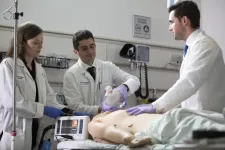(Press-News.org) Women could be opting to have unnecessary surgery to avoid breast cancer, after being told they are at high risk from genetic test results which do not take family history into account.
The authors of new research led by the University of Exeter have warned that women who discover, outside of a clinical setting, that they carry a disease-causing variant in one of the BRCA genes (BRCA1 or BRCA2) may be told their risk of breast cancer is 60-80 per cent. In fact, the risk could be less than 20 per cent if they do not have a close relative with the condition.
The warning has emerged in a paper published today in the Lancet journal eClinical Medicine. Until recently, women who received BRCA results did so because they attended clinic due to symptoms, or a family history of disease. The likelihood of certain BRCA variants causing breast cancer has been calculated based on this already high-risk group. However, many people now pay for home DNA testing kits, or are given results as part of taking part in genetic research, without ever having any personal link with breast cancer. The new research, funded by the Medical Research Council, was conducted to get a better idea of the true risk level of these BRCA variants in the general population.
The authors analysed more than 454,000 participants recruited between the ages of 40 and 69 in the UK Biobank study, which collects DNA samples and asks participants to report illness in themselves as well as parents and siblings. They found that simply carrying a disease-causing BRCA variant was linked to a breast cancer risk of 18 per cent (for BRCA2) and 23 per cent (for BRCA1) by age 60. Having a close relative who has had the condition elevated the risk to 24 per cent (for BRCA2) and 45 per cent (for BRCA1) .
Lead author Dr Leigh Jackson, of the University of Exeter Medical School, said more women were choosing to have breast cancer surgery, particularly since actress Angelina Jolie shared her family history of the disease and subsequent genetic test and surgery. But he said: “Being told you are at high genetic risk of disease can really influence levels of fear of a particular condition and the resulting action you may take. Up to 80 per cent risk of developing breast cancer is very different from 20 per cent. That difference could well influence the decision you make around whether you have invasive breast surgery. Some women may decide to go ahead with that procedure knowing that the risk is 20 per cent, but we want them to make an informed decision. We’d urge that anyone communicating cancer risk does so based on a detailed family history, not just genetics alone.”
The research team found a similar result when looking at genetic risk of Lynch syndrome, a genetic condition which increases the risk of colon cancer and some other cancers. The authors also concluded that genetic screening for these conditions in the general population could result in large numbers of people being exposed to needless scans or further procedures.
Co-author Professor Caroline Wright, of the University of Exeter Medical School, said: “Our findings will not just apply to breast and colorectal cancer. All risk estimates of genetic disease have so far largely been based on relatively high-risk groups who attend specialist clinics, so they will not necessarily translate to the general population. This finding has important ramifications for population screening using genome sequencing. We need to ensure we are carrying out research to find the true risk level, and also to be responsible in how we communicate risk, to avoid unnecessary fear and distress which may lead to avoidable procedures.”
The paper is entitled ‘Influence of family history on penetrance of hereditary cancers in a population setting’, and is published in eClinical Medicine.
If you’re given a high genetic risk of any disease outside of a clinical setting, we’d advise you to speak to your doctor, who will be able to take into account a range of factors including family history to assess whether the risk may be worth investigating further.
ENDS
END
Women receiving inflated risks from genetic testing could undergo unnecessary breast surgery
Women could be opting to have unnecessary surgery to avoid breast cancer, after being told they are at high risk from genetic test results which do not take family history into account.
2023-09-15
ELSE PRESS RELEASES FROM THIS DATE:
The Morton Arboretum awarded historic $15 million in federal IRA funds to improve urban forests in underserved Illinois communities
2023-09-14
LISLE, Ill. (September 14, 2023) — The Morton Arboretum in Lisle, Ill., announced it will receive $15 million in federal funding from the U.S. Forest Service through the Inflation Reduction Act (IRA) to expand and improve the tree canopy in disadvantaged communities throughout Illinois. The funding is part of a historic $1 billion investment to boost the nation’s urban tree cover in communities nationwide. The federal grant funding the Arboretum will receive is the largest award in Illinois, the largest award to a public garden in the country and a historic sum for the nonprofit tree-focused organization.
The U.S. ...
Scientists uncovered mystery of important material for semiconductors at the surface
2023-09-14
A team of scientists with the Department of Energy’s Oak Ridge National Laboratory has investigated the behavior of hafnium oxide, or hafnia, because of its potential for use in novel semiconductor applications.
Materials such as hafnia exhibit ferroelectricity, which means that they are capable of extended data storage even when power is disconnected and that they might be used in the development of new, so-called nonvolatile memory technologies. Innovative nonvolatile memory applications will pave the way for the creation of bigger and faster computer systems by alleviating the heat generated from the continual ...
RIT researcher receives award to advance study of cortical blindness
2023-09-14
Rochester Institute of Technology’s Gabriel Diaz, associate professor in the Chester F. Carlson Center for Imaging Science, has earned the Research to Prevent Blindness/Lions Clubs International Foundation Low Vision Research Award (LVRA), in collaboration with researchers at the University of Rochester.
The award is given annually to provide funding for innovative research, which demonstrates out-of-the-box thinking, focuses on the visual system that is damaged, and seeks greater understanding of how the visual system and brain respond to severe and chronic visual ...
$8.7M to vector-borne disease center funds training, evaluation
2023-09-14
ITHACA, N.Y. -- To help respond to emerging and established vector-borne threats, the Northeast Regional Center for Excellence in Vector-Borne Diseases (NEVBD), led by Cornell, has received a five-year, $8.7 million award from the Centers for Disease Control and Prevention (CDC) to train and educate current and future vector-borne disease professionals and to evaluate the effectiveness of community and regional prevention strategies.
The award, effective as of July, follows $10 million in ...
New device rapidly controls postpartum hemorrhage
2023-09-14
NEW YORK, NY, Sept. 14, 2023--A study led by Columbia obstetricians has shown that a new intrauterine device can rapidly control postpartum hemorrhage, a major cause of severe maternal morbidity and death, in real-world situations.
“Our findings show that the device is an important new tool in managing postpartum bleeding,” says Dena Goffman, MD, professor of obstetrics and gynecology at Columbia University Vagelos College of Physicians and Surgeons and senior author of the study.
“We had ...
Grant funds study of video game for preventing unintended teen pregnancies
2023-09-14
Weill Cornell Medicine has been awarded a five-year, $5 million grant from the United States Department of Health and Human Services through the Office of Population Affairs under the Teen Pregnancy Prevention Program to conduct a randomized trial testing whether a bilingual video game called “No Baby No (No Bebé No)” can increase the use of contraception among sexually active Black and Hispanic adolescents.
“Nine out of ten teens play video games. No Baby No empowers Black and Hispanic adolescents to learn about contraception, and the potential consequences of not using it, in a risk-free virtual ...
New evidence indicates patients recall death experiences after cardiac arrest
2023-09-14
Philadelphia, September 14, 2023 – Up to an hour after their hearts had stopped, some patients revived by cardiopulmonary resuscitation (CPR) had clear memories afterward of experiencing death and had brain patterns while unconscious linked to thought and memory, report investigators in the journal Resuscitation, published by Elsevier.
In a study led by researchers at NYU Grossman School of Medicine, in cooperation with 25 mostly US and British hospitals, some survivors of cardiac arrest described lucid death experiences that occurred while they were seemingly unconscious. Despite immediate treatment, fewer than 10% of the 567 patients studied, ...
Clinical whole genome sequencing test developed at JAX
2023-09-14
Until quite recently, it was extremely difficult to detect the variants underlying many genetic disorders. In the absence of a defined cause, clinicians have little to guide treatment for those left without a genetic diagnosis, forcing patients and families to embark on a diagnostic odyssey with no guarantee of finding answers.
A decade ago, sequencing centers began offering clinical whole exome sequencing, but these only cover the portion of the genome that codes for proteins – approximately 1.5 percent of the entire genome. While relatively successful, the diagnostic yield for most clinical exome sequencing programs is roughly 25 percent, leaving 75 percent of cases without ...
UCI researchers announce publication of an open-label clinical trial suggesting that N-acetylglucosamine restores neurological function in Multiple Sclerosis patients
2023-09-14
Irvine, CA – Sept. 14, 2023 – UCI researchers have found that a simple sugar, N-acetylglucosamine, reduces multiple inflammation and neurodegeneration markers in people who suffer from multiple sclerosis (MS). In addition, they also found this dietary supplement improved neurological function in 30% of patients.
According to the World Health Organization, MS affects more than 1.8 million people, and while there are treatments to prevent relapses and improve quality of life, there is no cure.
The study, N-acetylglucosamine ...
Vocal learning linked to problem solving skills and brain size
2023-09-14
The European starling boasts a remarkable repertoire. Versatile songbirds that learn warbles, whistles, calls, and songs throughout their lives, starlings rank among the most advanced avian vocal learners. Now a new study published in Science finds that starlings, along with other complex vocal learners, are also superior problem solvers.
“There is a long-standing hypothesis that only the most intelligent animals are capable of complex vocal learning,” says Jean-Nicolas Audet, a research ...
LAST 30 PRESS RELEASES:
Kidney cancer study finds belzutifan plus pembrolizumab post-surgery helps patients at high risk for relapse stay cancer-free longer
Alkali cation effects in electrochemical carbon dioxide reduction
Test platforms for charging wireless cars now fit on a bench
$3 million NIH grant funds national study of Medicare Advantage’s benefit expansion into social supports
Amplified Sciences achieves CAP accreditation for cutting-edge diagnostic lab
Fred Hutch announces 12 recipients of the annual Harold M. Weintraub Graduate Student Award
Native forest litter helps rebuild soil life in post-mining landscapes
Mountain soils in arid regions may emit more greenhouse gas as climate shifts, new study finds
Pairing biochar with other soil amendments could unlock stronger gains in soil health
Why do we get a skip in our step when we’re happy? Thank dopamine
UC Irvine scientists uncover cellular mechanism behind muscle repair
Platform to map living brain noninvasively takes next big step
Stress-testing the Cascadia Subduction Zone reveals variability that could impact how earthquakes spread
We may be underestimating the true carbon cost of northern wildfires
Blood test predicts which bladder cancer patients may safely skip surgery
Kennesaw State's Vijay Anand honored as National Academy of Inventors Senior Member
Recovery from whaling reveals the role of age in Humpback reproduction
Can the canny tick help prevent disease like MS and cancer?
Newcomer children show lower rates of emergency department use for non‑urgent conditions, study finds
Cognitive and neuropsychiatric function in former American football players
From trash to climate tech: rubber gloves find new life as carbon capturers materials
A step towards needed treatments for hantaviruses in new molecular map
Boys are more motivated, while girls are more compassionate?
Study identifies opposing roles for IL6 and IL6R in long-term mortality
AI accurately spots medical disorder from privacy-conscious hand images
Transient Pauli blocking for broadband ultrafast optical switching
Political polarization can spur CO2 emissions, stymie climate action
Researchers develop new strategy for improving inverted perovskite solar cells
Yes! The role of YAP and CTGF as potential therapeutic targets for preventing severe liver disease
Pancreatic cancer may begin hiding from the immune system earlier than we thought
[Press-News.org] Women receiving inflated risks from genetic testing could undergo unnecessary breast surgeryWomen could be opting to have unnecessary surgery to avoid breast cancer, after being told they are at high risk from genetic test results which do not take family history into account.






